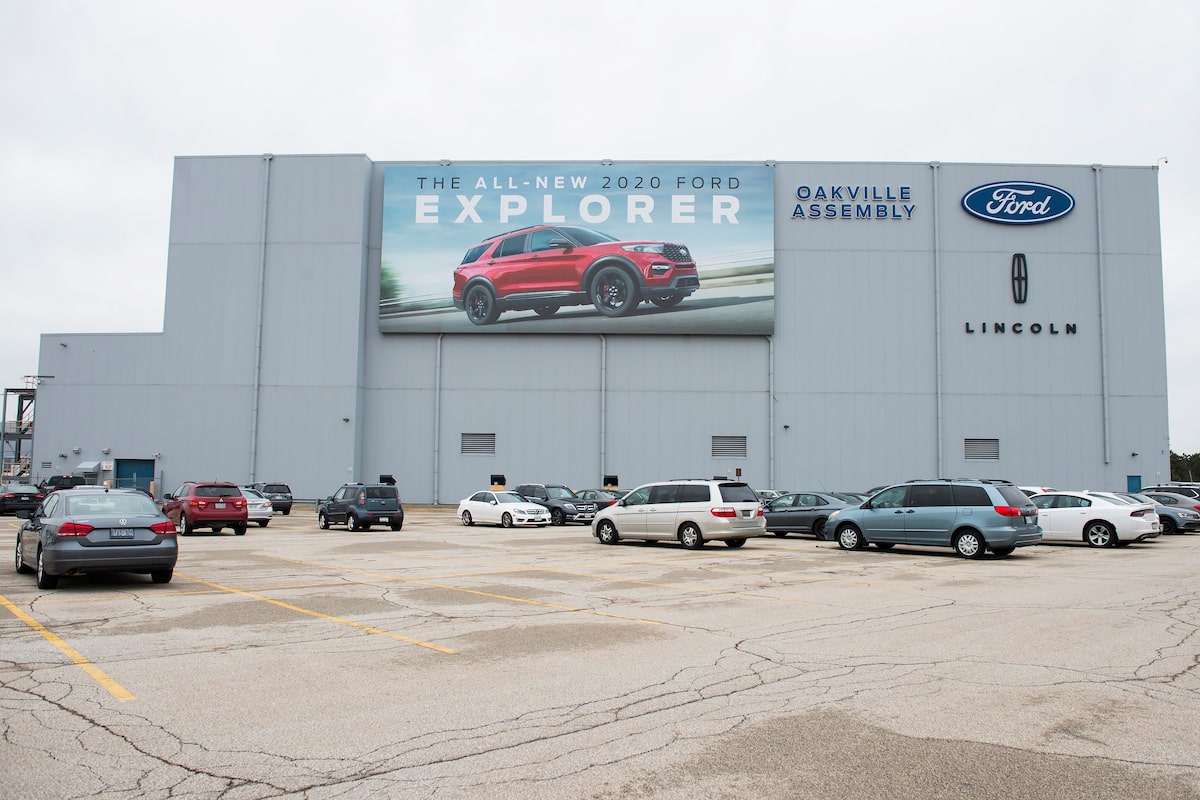The Ford assembly plant in Oakville, Ont., in March, 2020.Nathan Denette/The Canadian Press
Retooling work at Ford Motor Co.’s F-N plant in Oakville, Ont., is proceeding despite U.S. President Donald Trump’s announcement he will slap 25-per-cent tariffs on medium- and heavy-duty trucks.
Mr. Trump’s announcement that the import taxes will apply on Nov. 1 was expected and won’t change Ford’s plans to make F-Series Super Duty pickup trucks when the plant west of Toronto reopens next year, said Brian Kingston, president of the Canadian Vehicle Manufacturers’ Association, which represents Ford, General Motors Co. GM-N and Stellantis NV STLA-N in this country.
“Oakville plans have not changed,” said Robyn Jackson, a Ford spokeswoman.
Mr. Trump placed 25-per-cent tariffs on light vehicles from Canada and Mexico in April. At the same time, he launched an investigation into the national security implications of imported trucks, signalling more taxes were on the way.
“It was known that the [U.S.] administration was doing this investigation, and it was fully expected that they were going to come forward with a tariff,” Mr. Kingston said. “That doesn’t change the fact that this is another example of the administration doing intentional damage to its very own industry. It’s hard to see what the objective is here.”
Trump says 25% large truck tariff will start on Nov. 1
The coming tariff also applies to the Chevrolet Silverado HD pickup made at GM’s Oshawa plant.
GM said tariffs cost US$1.1-billion in the second quarter alone, while Ford has said tariffs will cost it about US$2-billion this year.
“It’s frustrating because we’re the most American auto company, and we export the most, and yet, we have this US$2-billion headwind, which prevents me from investing even more in the U.S.,” Ford chief executive officer Jim Farley said last week.
The Center for Automotive Research says the import taxes will raise costs for U.S. automakers by US$107-billion and reduce production at the Big Three by 6.8 million vehicles.
Sam Fiorani, an analyst with Pennsylvania’s AutoForecast Solutions Inc., said Ford and GM are sticking with their Canadian plants in the expectation that tariffs will be reduced when the U.S.-Mexico-Canada continental free-trade agreement is renegotiated.
He said it is likely Canadian auto imports will be taxed at 15 per cent, based on deals Mr. Trump has reached with South Korea, Japan and the European Union.
“The U.S. and Canada have a special relationship and to put a tariff on vehicles and parts that come across the border would make North America less competitive on a global scale,” he said by phone.
Officials to continue trade talks into the night after Carney, Trump meet
GM said its Oshawa production plan is not changing as a result of the tariff announcement.
Ford’s Oakville plant, which used to make the Ford Edge and Lincoln Nautilus, closed in 2024 as the Detroit-based automaker announced a $1.8-billion plan to make electric vehicles in Oakville. About 3,000 people were sent home on layoff.
As EV sales slowed, that plan was delayed and then cancelled. Ford instead said it would make large gasoline-burning trucks in Oakville, spending US$2.3-billion to refit the factory with new assembly and stamping machinery.
The Super Duty trucks, which include the F-250, F-350 and F-450, start at $63,000 and are very profitable for the automaker. Ford said the plant will employ 1,800 jobs – 400 more than would be needed at the EV plant. Another 150 jobs will be added at Ford’s Windsor plant to make engines for the trucks.
Ford has said the production in Oakville will supplement output at truck plants in Kentucky and Ohio, which are running at full capacity.
GM’s Oshawa plant makes light- and heavy-duty versions of the Silverado, with annual output of 40,000 and 60,000, respectively, according to Mr. Fiorani. GM will cut the plant’s third production shift in January, eliminating 700 jobs after it boosted production and employment at its Silverado plant in Fort Wayne, Ind.

